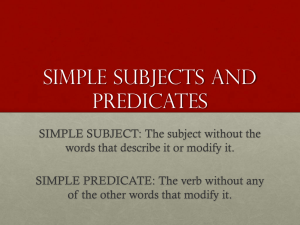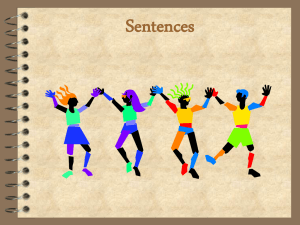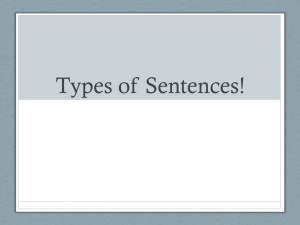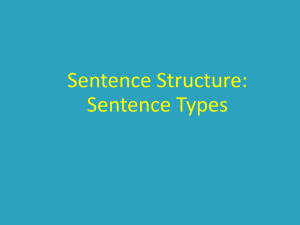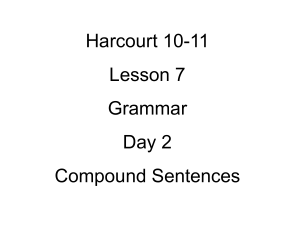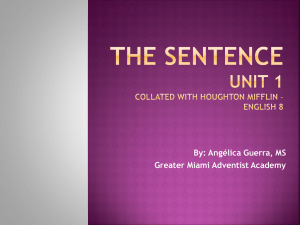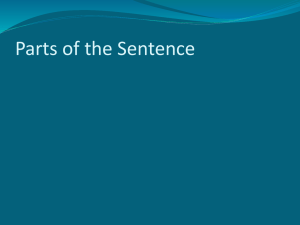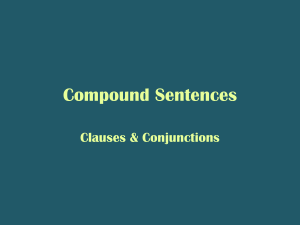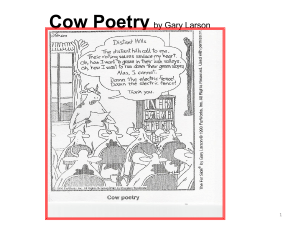Lesson 10
advertisement
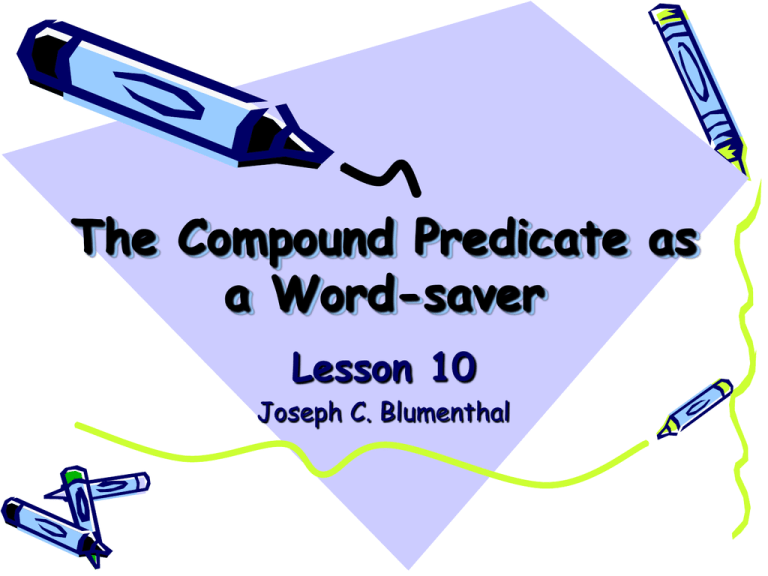
The Compound Predicate as a Word-saver Lesson 10 Joseph C. Blumenthal In a compound sentence, the conjunction and, but, or or stands between two word groups, each with a subject and a predicate. Hank swung the ball, but he missed it by a foot. What is the subject of the part of the sentence that follows the conjunction but? In a compound sentence, the conjunction and, but, or or stands between two word groups, each with a subject and a predicate. Hank swung the ball, but he missed it by a foot. What is the subject of the part of the sentence that follows the conjunction but? he Hank swung the ball, but (he) missed it by a foot. Would this sentence still make good sense if we omitted the subject he that follows the conjunction? (yes, no) Hank swung the ball, but (he) missed it by a foot. Would this sentence still make good sense if we omitted the subject he that follows the conjunction? (yes, no) Hank swung the ball but missed it by a foot. This is no longer a compound sentence because, after the conjunction but, we now have only a (subject, predicate). Hank swung the ball but missed it by a foot. This is no longer a compound sentence because, after the conjunction but, we now have only a (subject, predicate). Hank swung the ball but missed it by a foot. This sentence has two predicates. Each predicate makes a statement about the same subject, _____. Hank swung the ball but missed it by a foot. This sentence has two predicates. Each predicate makes a statement about the same subject, Hank . a. Hank swung the ball, but he missed it by a foot. b. Hank swung the ball but missed it by a foot. Sentence a is a compound sentence because the conjunction but connects two sentences. Sentence b is a simple sentence with a compound predicate because the conjunction but connects two ________. a. Hank swung the ball, but he missed it by a foot. b. Hank swung the ball but missed it by a foot. Sentence a is a compound sentence because the conjunction but connects two sentences. Sentence b is a simple sentence with a compound predicate because the conjunction but connects two predicates. A careful writer streamlines his writing by eliminating all useless words. Words that add nothing to the meaning, clearness, or interest of a sentence should be dropped. a. Hank swung the ball, but he missed it by a foot. b. Hank swung the ball but missed it by a foot. Which sentence says the same thing in fewer words? (a, b) A careful writer streamlines his writing by eliminating all useless words. Words that add nothing to the meaning, clearness, or interest of a sentence should be dropped. a. Hank swung the ball, but he missed it by a foot. b. Hank swung the ball but missed it by a foot. Which sentence says the same thing in fewer words? (a, b) Bobby frightened the bird, and it flew up into a tree. What is the subject of the part of the sentence which follows the conjunction and? ____ Bobby frightened the bird, and it flew up into a tree. What is the subject of the part of the sentence which follows the conjunction and? _it_ Bobby frightened the bird, and it flew up into a tree. Would this sentence still make good sense if we omitted the subject it, which follows the conjunction? (yes, no) Bobby frightened the bird, and it flew up into a tree. Would this sentence still make good sense if we omitted the subject it, which follows the conjunction? (yes, no) Bobby frightened the bird, and it flew up into a tree. Our word-saving device does not work here because each predicate makes a statement about (a different, the same) subject. Bobby frightened the bird, and it flew up into a tree. Our word-saving device does not work here because each predicate makes a statement about (a different, the same) subject. Hank swung at the ball, but he mislead it by a foot. We can change this compound sentence to a sentence with a compound predicate because both predicates make statements about the same person, ________. Hank swung at the ball, but he mislead it by a foot. We can change this compound sentence to a sentence with a compound predicate because both predicates make statements about the same person, __Hank__. Bobby frightened the bird, and (it) flew up into a tree. We cannot change this compound sentence to a sentence with a compound predicate because the first predicate makes a statement about Bobby, and the second predicate makes a statement about _______. Bobby frightened the bird, and (it) flew up into a tree. We cannot change this compound sentence to a sentence with a compound predicate because the first predicate makes a statement about Bobby, and the second predicate makes a statement about it or bird. We can change a compound sentence to a sentence with a compound predicate only when both predicates make statements about the _______ subject. We can change a compound sentence to a sentence with a compound predicate only when both predicates make statements about the __same__ subject. The students went to England by boat. They returned by plane. In combining these two sentences, which word would you omit? ________ The students went to England by boat. They returned by plane. In combining these two sentences, which word would you omit? __They___ a. The coach went to the blackboard, and he drew a diagram of the play. b. The curtain went up, and the show began. Which compound sentence can be changed to a sentence with a compound predicate because both predicates make statements about the same subject? (a, b) a. The coach went to the blackboard, and he drew a diagram of the play. b. The curtain went up, and the show began. Which compound sentence can be changed to a sentence with a compound predicate because both predicates make statements about the same subject? (a, b) The coach went to the blackboard, and he drew a diagram of the play. The curtain went up, and the show began. When we change a compound sentence to a sentence with a compound predicate, we (keep, drop) the comma. The coach went to the blackboard, and he drew a diagram of the play. The curtain went up, and the show began. When we change a compound sentence to a sentence with a compound predicate, we (keep, drop) the comma. a. We won our first game, but we lost the second. b. We won our first game but lost our second. No comma is used before a conjunction that connects two parts of a compound (sentence, predicate). a. We won our first game, but we lost the second. b. We won our first game but lost our second. No comma is used before a conjunction that connects two parts of a compound (sentence, predicate). a. We heard a voice, but we couldn’t recognize it. b. We heard a voice, but couldn’t recognize it. In which sentence should the comma before the conjunction be dropped because it is not a compound sentence? (a, b) a. We heard a voice, but we couldn’t recognize it. b. We heard a voice, but couldn’t recognize it. In which sentence should the comma before the conjunction be dropped because it is not a compound sentence? (a, b) a. A large tree had fallen and was blocking traffic. b. A large tree had fallen and traffic was slowed down. In which sentence should a comma be inserted before the conjunction? (a, b) a. A large tree had fallen and was blocking traffic. b. A large tree had fallen and traffic was slowed down. In which sentence should a comma be inserted before the conjunction? (a, b) The teacher liked the movie. She urged her classes to see it. If you were to combine these two sentences, it would be better to use a compound (sentence, predicate). The teacher liked the movie. She urged her classes to see it. If you were to combine these two sentences, it would be better to use a compound (sentence, predicate). The teacher liked the movie and urged her classes to see it. Should a comma be inserted before the conjunction and? (yes, no) The teacher liked the movie and urged her classes to see it. Should a comma be inserted before the conjunction and? (yes, no) We have good traffic laws. They are strictly enforced. If you were to combine these two sentences, you would need to use a compound (sentence, predicate). We have good traffic laws. They are strictly enforced. If you were to combine these two sentences, you would need to use a compound (sentence, predicate). We have good traffic laws and they are strictly enforced. Should a comma be inserted before the conjunction and? (yes, no) We have good traffic laws and they are strictly enforced. Should a comma be inserted before the conjunction and? (yes, no) The crowded bus stopped. It took on still more people. If you were to combine these two sentences, it would be better to use a compound (sentence, predicate). The crowded bus stopped. It took on still more people. If you were to combine these two sentences, it would be better to use a compound (sentence, predicate). Write the following answers on your own sheet of paper. In this and the following frames, combine each pair of sentences, using a compound predicate whenever possible. Indicate your answer by writing the conjunction and the two words surrounding it. Insert any necessary comma. Garvey made a two-base hit. The ball game was over. 1. ________ _______ ________ Insert any necessary comma. Combine each pair of sentences, using a compound predicate whenever possible. Indicate your answer by writing the conjunction and the two words surrounding it. Insert any necessary comma. Paul wanted a date. He was too timid to ask. 2. ________ _______ ________ Insert a comma only when you form a compound sentence. Combine each pair of sentences, using a compound predicate whenever possible. Indicate your answer by writing the conjunction and the two words surrounding it. Insert any necessary comma. It was getting late. The children were growing restless. 3. ________ _______ ________ Insert a comma only when you form a compound sentence. Combine each pair of sentences, using a compound predicate whenever possible. Indicate your answer by writing the conjunction and the two words surrounding it. Insert any necessary comma. Most Americans want their children to attend college. They will make great sacrifices to send them. 4. ________ _______ ________ Insert a comma only when you form a compound sentence. Combine each pair of sentences, using a compound predicate whenever possible. Indicate your answer by writing the conjunction and the two words surrounding it. Insert any necessary comma. You must be completely satisfied. We will return your money. 5. ________ _______ ________ Insert a comma only when you form a compound sentence. Combine each pair of sentences, using a compound predicate whenever possible. Indicate your answer by writing the conjunction and the two words surrounding it. Insert any necessary comma. My sister can play several instruments. Her favorite is the violin. 6. ________ _______ ________ Insert a comma only when you form a compound sentence. Combine each pair of sentences, using a compound predicate whenever possible. Indicate your answer by writing the conjunction and the two words surrounding it. Insert any necessary comma. Shall I write a new theme? Shall I revise the old one? 7. ________ _______ ________ Since these are questions, you also have to omit the word shall. Sometimes we want the balanced effect of a compound sentence even though a compound predicate would express our meaning in fewer words. a. Fashions come and fashions go. b. Fashions come and go. Which sentence gives a more balanced effect? 8. (a, b) a. He couldn’t eat and couldn’t sleep. b. He couldn’t eat, and he couldn’t sleep. Which sentence is more effective because of the repetition of the subject? 9. (a, b) 10. Except where we wish to produce a special effect, we should try to save words by using a compound (sentence, predicate). You are done!!!
